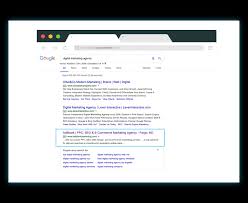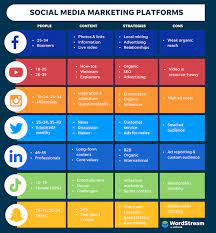In today’s digital age, having a strong online presence is crucial for businesses of all sizes. Whether you’re a small local business or a large corporation, digital marketing can help you reach your target audience and grow your brand. If you’re searching for “digital marketing services near me,” you’re likely looking for professional assistance to navigate the complex world of online marketing.
Digital marketing services encompass a wide range of strategies and techniques aimed at promoting your business online. These services include search engine optimization (SEO), social media marketing, pay-per-click (PPC) advertising, content marketing, email marketing, and more. By leveraging these tools effectively, digital marketing agencies can help drive traffic to your website, increase brand visibility, generate leads, and ultimately boost sales.
When searching for digital marketing services near you, it’s important to consider several factors. First and foremost, look for an agency that has a proven track record of success. Check their portfolio and client testimonials to ensure they have experience working with businesses similar to yours.
Additionally, consider the specific services they offer. Do they specialize in SEO? Are they proficient in social media management? Assess your own needs and find an agency that aligns with your goals.
Another crucial aspect is communication and collaboration. Find an agency that values open communication and is willing to work closely with you to understand your business objectives. They should be able to provide regular reports on the progress of their efforts and be open to feedback and adjustments along the way.
Local expertise can also be advantageous when choosing a digital marketing service provider near you. They will have a better understanding of the local market dynamics and consumer behavior in your area.
Lastly, consider the cost-effectiveness of the services provided. While it’s important not to compromise quality for price, finding an agency that offers competitive pricing within your budget is essential.
In conclusion, if you’re searching for “digital marketing services near me,” take the time to research and find an agency that meets your specific needs. A reliable and experienced digital marketing partner can help you navigate the ever-evolving online landscape, reach your target audience effectively, and achieve your business goals. So, don’t hesitate to invest in professional digital marketing services to stay ahead of the competition in today’s digital world.
5 Frequently Asked Questions About Digital Marketing Services Near Me
- What digital marketing services are available near me?
- What type of digital marketing strategies should I use?
- How much does digital marketing cost?
- How can I measure the success of my digital marketing efforts?
- What is the best way to reach my target audience through digital marketing?
What digital marketing services are available near me?
When searching for digital marketing services near you, you’ll find a variety of options available. Here are some common digital marketing services that are often offered by agencies:
- Search Engine Optimization (SEO): SEO focuses on improving your website’s visibility in search engine results pages. This includes optimizing your website’s content, meta tags, and technical aspects to rank higher in search engine rankings.
- Pay-Per-Click (PPC) Advertising: PPC advertising involves running targeted ads on search engines or social media platforms. Advertisers pay a fee each time their ad is clicked, driving traffic to their website or landing page.
- Social Media Marketing: Social media marketing involves creating and managing social media accounts to engage with your target audience, build brand awareness, and drive traffic to your website.
- Content Marketing: Content marketing focuses on creating valuable and relevant content such as blog posts, articles, videos, infographics, and more to attract and engage your target audience.
- Email Marketing: Email marketing involves sending targeted emails to a specific audience to promote products or services, share updates or news, build customer loyalty, and generate leads.
- Conversion Rate Optimization (CRO): CRO aims to improve the percentage of website visitors who take desired actions such as making a purchase or filling out a contact form. It involves analyzing user behavior and making data-driven changes to optimize conversions.
- Web Design and Development: Many agencies also offer web design and development services to create user-friendly websites that align with your brand identity and provide a seamless user experience.
- Online Reputation Management (ORM): ORM focuses on monitoring and managing online reviews, feedback, and mentions about your business across various platforms to maintain a positive online reputation.
These are just a few examples of the digital marketing services commonly available near you. The specific range of services may vary depending on the agency you choose. It’s important to research local agencies thoroughly to find the one that offers the services you need to achieve your marketing goals.
What type of digital marketing strategies should I use?
When it comes to digital marketing strategies, there are numerous options available, and the best approach will depend on your specific business goals, target audience, industry, and budget. However, here are some commonly used and effective strategies that you can consider:
- Search Engine Optimization (SEO): Optimizing your website to rank higher in search engine results pages (SERPs) can drive organic traffic to your site. This involves keyword research, on-page optimization, technical SEO, and building high-quality backlinks.
- Pay-Per-Click (PPC) Advertising: With PPC advertising, you pay each time someone clicks on your ad. Platforms like Google Ads and social media advertising networks allow you to target specific keywords or demographics to reach your desired audience.
- Social Media Marketing: Engaging with your audience on social media platforms like Facebook, Instagram, Twitter, LinkedIn, or YouTube can help build brand awareness and drive traffic to your website. Create compelling content and interact with users through posts, stories, videos, and ads.
- Content Marketing: Creating valuable and informative content such as blog posts, articles, videos, infographics, or podcasts can establish you as an authority in your industry while attracting and engaging your target audience.
- Email Marketing: Building an email list allows you to communicate directly with potential customers who have shown interest in your products or services. Send targeted emails with personalized content to nurture leads and encourage conversions.
- Influencer Marketing: Collaborating with influencers who have a significant following in your niche can help increase brand visibility and reach a wider audience that trusts their recommendations.
- Remarketing: Targeting users who have previously visited your website but did not convert can be done through remarketing campaigns. Display ads or personalized emails can remind them of their interest and encourage them to return.
- Video Marketing: Utilize the power of video by creating engaging content for platforms like YouTube or incorporating videos into your website and social media channels. Videos can help tell your brand story, demonstrate products, or provide educational content.
Remember, it’s important to analyze your target audience, industry trends, and competitors to determine which strategies will work best for your business. A combination of these strategies tailored to your specific needs can help you achieve your digital marketing goals effectively.
How much does digital marketing cost?
The cost of digital marketing can vary significantly depending on various factors, such as the scope of services, the size of your business, your industry, and the specific goals you want to achieve. It’s important to understand that digital marketing is not a one-size-fits-all solution, and therefore the cost can differ from one business to another.
Some common pricing models for digital marketing services include:
- Hourly Rates: Some agencies or freelancers charge an hourly rate for their services. The rate can vary depending on the expertise and experience of the professionals involved.
- Project-Based Pricing: For specific projects with well-defined goals and deliverables, agencies may offer a fixed price for their services. This can include website development, SEO audits, or social media campaigns.
- Monthly Retainer: Many agencies work on a monthly retainer basis where you pay a fixed fee each month for ongoing digital marketing services. This model often includes a combination of various strategies tailored to your business needs.
- Performance-Based Pricing: In certain cases, agencies may offer performance-based pricing models where they receive compensation based on achieving specific results or key performance indicators (KPIs), such as lead generation or sales.
It’s important to note that while there are general pricing trends in the industry, the actual cost will depend on your unique requirements and goals. It’s recommended to consult with multiple digital marketing agencies or professionals to get quotes based on your specific needs.
Remember that investing in digital marketing is an investment in your business’s growth and online presence. While it’s important to consider costs, it is equally crucial to focus on finding a reputable agency that can deliver results aligned with your objectives rather than solely focusing on price alone.
Ultimately, the cost of digital marketing should be viewed as an investment rather than an expense as it has the potential to generate significant returns by driving traffic, increasing brand visibility, and boosting conversions for your business.
How can I measure the success of my digital marketing efforts?
Measuring the success of your digital marketing efforts is essential to understand the effectiveness of your strategies and make informed decisions for future campaigns. Here are some key metrics and methods you can use to measure the success of your digital marketing efforts:
- Website Traffic: Monitor the number of visitors to your website using tools like Google Analytics. Analyze trends over time and identify which channels are driving the most traffic.
- Conversion Rate: Track how many website visitors take desired actions, such as making a purchase, filling out a form, or subscribing to a newsletter. Calculate your conversion rate by dividing the number of conversions by the total number of visitors.
- Return on Investment (ROI): Determine how much revenue you generate in relation to your digital marketing spend. Compare the cost of running campaigns with the revenue they generate to assess their effectiveness.
- Cost per Acquisition (CPA): Calculate how much it costs you to acquire a new customer or lead through your digital marketing efforts. Divide your total campaign costs by the number of acquisitions during a specific period.
- Click-Through Rate (CTR): Measure how often people click on your ads or email links compared to the number of impressions they receive. A higher CTR indicates that your messaging is engaging and relevant.
- Social Media Engagement: Assess engagement metrics on social media platforms, such as likes, shares, comments, and follower growth rate. These metrics provide insights into audience engagement and brand awareness.
- Email Marketing Metrics: Analyze email open rates, click-through rates, and unsubscribe rates to gauge the effectiveness of your email campaigns and optimize future communications.
- Search Engine Rankings: Monitor where your website ranks in search engine results pages (SERPs) for targeted keywords related to your business. Higher rankings indicate improved visibility and potential organic traffic growth.
- Customer Lifetime Value (CLTV): Evaluate how much value each customer brings over their lifetime with your business by analyzing their purchasing habits, repeat purchases, and average order value. This metric helps assess the long-term impact of your digital marketing efforts.
- Surveys and Feedback: Collect feedback from customers through surveys or online reviews to gain qualitative insights into their satisfaction, perception of your brand, and the impact of your digital marketing efforts.
Remember, the specific metrics you focus on will depend on your business goals and digital marketing strategies. Regularly track and analyze these metrics to identify areas for improvement, optimize campaigns, and make data-driven decisions that drive success in your digital marketing efforts.
What is the best way to reach my target audience through digital marketing?
Reaching your target audience effectively through digital marketing requires a strategic approach that considers various factors. Here are some key steps to help you reach your target audience:
- Define Your Target Audience: Start by clearly defining your target audience. Understand their demographics, interests, behaviors, and pain points. This will help you tailor your marketing messages and choose the right channels to reach them.
- Conduct Market Research: Conduct thorough market research to gain insights into your target audience’s online behavior. Identify which platforms they frequent, what content they engage with, and what influences their purchasing decisions.
- Develop Buyer Personas: Create detailed buyer personas that represent different segments of your target audience. This will allow you to personalize your marketing efforts and create content that resonates with each persona.
- Choose the Right Channels: Select the digital channels that align with your target audience’s preferences and behaviors. This could include search engines, social media platforms, email marketing, content marketing, influencer partnerships, or even mobile apps.
- Optimize for Search Engines: Implement search engine optimization (SEO) techniques to improve your website’s visibility in search engine results pages (SERPs). This will help potential customers find you when they search for relevant keywords.
- Leverage Social Media: Utilize social media platforms where your target audience is active. Develop a strong social media presence by sharing engaging content, interacting with followers, running targeted ads, and leveraging influencers if appropriate for your brand.
- Content Marketing Strategy: Create valuable and relevant content that addresses the needs and interests of your target audience. This can include blog articles, videos, infographics, podcasts, or e-books. Share this content across various channels to attract and engage potential customers.
- Paid Advertising: Consider using pay-per-click (PPC) advertising on search engines or social media platforms to directly reach your target audience based on specific demographics or keywords.
- Email Marketing: Implement an email marketing strategy to nurture leads and maintain communication with your target audience. Provide valuable content, exclusive offers, and personalized messages to keep them engaged.
- Analytics and Optimization: Regularly monitor and analyze the performance of your digital marketing campaigns. Use analytics tools to track key metrics such as website traffic, engagement rates, conversion rates, and ROI. Adjust your strategies based on these insights to optimize your efforts.
Remember that reaching your target audience through digital marketing is an ongoing process. Continuously refine your strategies based on data-driven insights, adapt to changing trends, and stay updated with the latest digital marketing techniques to ensure you are effectively reaching and engaging with your audience.




